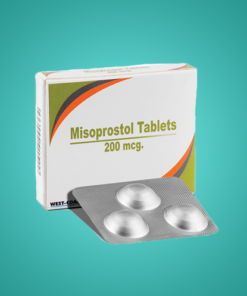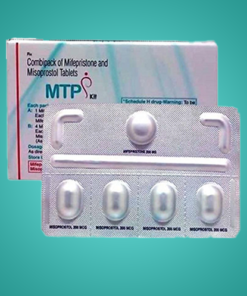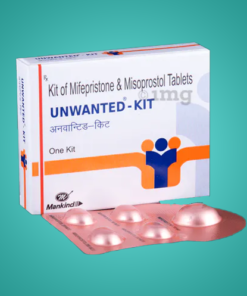Description
What is Misoprostol Tablet?
Misoprostol Tablet is a synthetic prostaglandin E1 (PGE1) analog used in various medical treatments. It mimics the action of natural prostaglandins in the body and is primarily used for gastrointestinal and reproductive health purposes. Available in oral form, Misoprostol is a prescription medication that must be used under the supervision of a qualified healthcare provider.
What is the Use of Misoprostol Tablet?
Misoprostol is used for multiple medical purposes, including:
-
Prevention of stomach ulcers: Especially in patients taking NSAIDs (non-steroidal anti-inflammatory drugs), Misoprostol helps protect the stomach lining.
-
Medical termination of pregnancy: Used alone or in combination with mifepristone for non-surgical abortion.
-
Induction of labor: Under strict medical supervision, it can help induce uterine contractions.
-
Treatment of postpartum hemorrhage: Used to control bleeding after childbirth.
-
Cervical ripening: Before surgical procedures involving the uterus, such as D&C or IUD insertion.
Benefits of Misoprostol Tablet
-
Effective ulcer prevention: Protects the gastrointestinal lining for patients on long-term NSAIDs.
-
Non-invasive option for abortion: Provides a safe, non-surgical method for terminating early pregnancy.
-
Reduces postpartum bleeding: Helpful in emergency situations where other treatments may not be available.
-
Convenient oral administration: Eliminates the need for injections or surgical interventions in many cases.
-
Cost-effective: Generally affordable and accessible in many healthcare settings.
Side Effects of Misoprostol Tablet
Like all medications, Misoprostol may cause side effects. Common and less serious side effects include:
-
Nausea
-
Diarrhea
-
Abdominal cramping
-
Headache
-
Fever or chills (especially during medical abortion)
Serious but rare side effects may include:
-
Severe allergic reactions (rash, itching/swelling, dizziness)
-
Excessive vaginal bleeding
-
Uterine rupture (rare, mainly in late pregnancy or high doses)
Always consult a healthcare provider before starting or stopping this medication, and report any unusual symptoms promptly.
Important Warnings and Precautions
-
Not to be used during pregnancy unless under medical supervision for abortion or labor induction.
-
Should not be taken by women with known allergies to prostaglandins.
-
Ensure correct dosage as prescribed, especially during pregnancy-related uses to avoid complications.
-
What is Misoprostol Tablet used for?
Misoprostol is used to prevent stomach ulcers, induce labor, treat postpartum hemorrhage, and for medical termination of early pregnancy (usually with mifepristone). -
How does Misoprostol work?
It mimics natural prostaglandins, helping to protect the stomach lining or cause uterine contractions depending on its use. -
Can Misoprostol be used alone for abortion?
Yes, it can be used alone, but it is more effective and safer when combined with mifepristone under medical supervision. -
How should Misoprostol be taken?
Misoprostol may be taken orally, sublingually (under the tongue), or vaginally, depending on the condition being treated and doctor’s instructions. -
What is the usual dosage of Misoprostol for abortion?
The dosage varies but commonly includes 800 mcg (4 tablets of 200 mcg each), administered either orally or vaginally, often after taking mifepristone. -
How long does Misoprostol take to work?
For abortion, effects usually begin within 1–4 hours. For ulcer prevention, it works continuously while the medication is taken regularly. -
What are the common side effects of Misoprostol?
Nausea, diarrhea, abdominal pain, cramping, chills, and fever are the most common. -
Can I take Misoprostol during pregnancy?
Misoprostol should not be used during pregnancy unless specifically prescribed for labor induction or abortion, as it can cause miscarriage or birth defects. -
Is Misoprostol safe for breastfeeding women?
Small amounts may pass into breast milk. Consult your doctor before use while breastfeeding. -
How effective is Misoprostol for abortion?
When used correctly (especially with mifepristone), it is over 95% effective in early pregnancy termination. -
What should I do if I vomit after taking Misoprostol?
If vomiting occurs shortly after taking the tablet, contact your doctor. You may need to take an additional dose. -
Can Misoprostol cause heavy bleeding?
Yes, especially when used for abortion or postpartum bleeding control. Monitor bleeding and seek medical help if it’s excessive. -
Are there any foods or drugs to avoid while taking Misoprostol?
Avoid alcohol and NSAIDs unless prescribed, and inform your doctor about all medications you’re taking. -
How should Misoprostol be stored?
Store at room temperature, away from heat, moisture, and direct sunlight. Keep out of reach of children. -
Do I need a prescription for Misoprostol?
Yes, Misoprostol is a prescription-only medication in most countries due to its powerful effects and potential risks.






Reviews
There are no reviews yet.